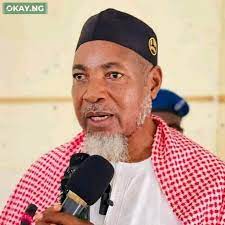CONSOLIDATING EXECUTIVE-LEGISLATIVE AND JUDICIARY RELATIONS FOR GOOD GOVERNANCE IN NIGERIA, TEXT OF THE PAPER DELIVERED BY MOHAMMED ATABA-SANI OMOLORI, AT THE LEADERSHIP RETREAT OF THE 10TH NATIONAL ASSEMBLY, ON 22ND SEPTEMBER, 2023, AT IKOT EKPENE, AKWA IBOM STATE
[Protocol]I am delighted to deliver a paper on Consolidating Executive-Legislative and Judiciary Relations for Good Governance in Nigeria at this retreat for Leadership of the 10th National Assembly. I commend the Leadership for this important initiative coming so early in the life of the Assembly. This retreat demonstrates that your approach to representation, lawmaking and oversight will be based on carefully articulated principles. It demonstrates, quite clearly, the desire of this leadership to build on the efforts of the past leaderships of the National Assembly over the years to which I can testify.
The topic: Consolidating Executive Legislature and Judiciary Relations for Good Governance in Nigeria carries some assumptions and postulations. The need for a relationship between the Three arms of Government; the need to consolidate those relatiships and then the destination of such consolidation: GOOD GOVERNANCE IN NIGERIA. So from the onset, we are tuned to the idea that a consolidated relationship between these tiers of government can culminate in good governance. However, this assumption is a whole issue for discussion at another day.
My paper today is how to consolidate a relationship to achieve good governance. I will limit it to the relationship with suggestions on how to consolidate and hope that it will achieve our desired end. So, broadly speaking, how do these tiers function as far as to desire consolidation in their relationship?
The National Assembly is generally mandated to make laws for good governance in the country. In discharging its constitutional mandate, the National Assembly in- evitably interacts with other arms of government, especially the Executive. In fact, even the lawmaking power of the legislature is shared with the Executive. For in-stance, for a Bill to become a law, it requires presidential assent, except when the leg- islature decides to override the President’s veto. Additionally, the 1999 Constitution in section 5(1)(b) confers on the President additional powers, such as ensuring that provisions of the Constitution are brought into effect and that laws enacted by the Na- tional Assembly are executed in conformity with the Constitution. Section 32 of the Constitution gives the President powers to make laws pertaining to the prescription of special immigrant status with full residential rights to non-Nigerian spouses of citizens of Nigeria who do not wish to acquire Nigerian citizenship. Another example is the right conferred on the Chief Justice of Nigeria to make rules with respect to the prac- tice and procedure of a High Court in accordance with Section 46(3) of the 1999 Con- stitution of the Federal Republic of Nigeria (as Amended).
The Constitution further grants the President the power to establish certain Federal Executive bodies as may be required (Section 153). There are several other instances in which the powers of the National Assembly intersect, for instance, the power over public funds, appointment and removal of certain officials, war powers, treaty-making powers and declaration of a state of emergency.
In addition to the above, the lawmaking powers of the legislature can be delegated to other institutions, groups or persons other than the legislature. This power is conferred through an Act of the National Assembly, the Constitution or the authority to make laws. Section 37 of the Interpretation Act defined a subsidiary instrument as ‘any or- der, rules, regulation, rules of court, bye-laws made either before or after the com- mencement of this Act in the exercise of powers conferred by an Act.’ The subsidiary bodies that power can be delegated to include the President, governors, ministers, commissioners, administrative agencies, professional bodies, etc. These legislations derive their legitimacy from Acts of Parliament, and they can only be made where there is express provision in the Primary Legislation to do so.
Even in exercising its oversight powers, the legislature requires information and data from executive agencies to supervise government policies and programmes properly.This little detour is intended to establish how the powers and functions of the legisla- ture, the Executive and the judiciary intersect and also to emphasize the importance of a harmonious relationship between all arms of government. I will proceed to first ex- amine the nature of this relationship in an ideal setting. Following that, the discussion will focus on the ingredients needed to facilitate, achieve and consolidate inter-arm collaboration. This is followed by what I consider the core of my paper. I argue that to improve and consolidate the relationship between the three arms of government, each arm must first improve its intra-branch systems and processes. Without this, the vari- ous arms of government are bound to engage in needless altercations and conflicts. In advancing this argument, the challenges faced by the National Assembly with regard to intra-branch relationships will be discussed and how this can be addressed to make the legislature an example to other arms. An aspect of my paper examines the topic from the perspective of the Executive.
Executive-Legislative-Judiciary Relations in an ‘Ideal’ Democracy
In this section, I use the word ‘ideal’ advisedly not to refer to a ‘perfect’ or ‘utopian’ government but to denote more ‘advanced’ democracies, which are characterised by qualities that include a holistic regime of the rule of law. and very strong institutions. This means everyone, including government officials, is subject to and accountable under the law. Laws are clear, just, and enforced fairly, ensuring that the rights and freedoms of citizens are protected but more importantly, the feature of these “ad- vanced” democracies that facilitates relationships among the tiers of government is STRONG INSTITUTIONS.
With very strong institutions, accountability and strict adherence to the rule of law is guaranteed. Each arm of government ensures their actions are in conformity with the constitutional guidelines. Even on this, you will realize that once you “do your own” and do it well, a strong basis for peaceful co-existence is guaranteed.
An ideal democracy features a government that is accountable to the people, elected officials are responsible for their actions and decisions, and checks and balances are inplace to prevent abuse of power. In this regard, an independent judiciary is crucial for upholding the rule of law and ensuring the government does not overstep its bounds.
Other attributes of the “advanced” democracy include pluralism and political diversi- ty, including multiple political parties representing various ideologies and interests. This allows citizens to have meaningful choices during elections. It also protects the rights and interests of minority and disadvantaged groups, ensuring they are not dis- criminated against or marginalised by the majority. However, even more fundamental is the correlation between “advanced” democracy and a higher standard of living due to the conducive environment for economic growth and development. It’s important to note that achieving and maintaining these characteristics is an ongoing process, and even such “advanced” democracies can face challenges and setbacks. Additionally, the specific nature and implementation of democracy can vary from one country to anoth- er, considering cultural, historical, and political contexts.
Having clarified what an ideal or advanced democracy entails and some of its impor- tant features, I will briefly examine the nature of executive-legislative and judiciary relations within that context. In such democracies, the relationship between the three arms of government is characterised essentially by a system of checks and balances designed to ensure the protection of individual rights, the rule of law, and the effective functioning of government. The separation of powers, propagated by various philoso- phers and thinkers, simply means that each branch has distinct and independent pow- ers and responsibilities, which serve as a check on the others. In the absence of such checks, even a democracy soon descends into a dictatorship. Separation of powers implies that the various arms operate within the framework of the law, and no one is above the law. The judiciary plays a crucial role in interpreting and upholding the law.
In practical terms, separation of powers in a advanced democracy, there is a strict ad- herence to the Constitution and its provisions on the scope and limits of the powers of each arm. The legislature is not only responsible for making and amending laws but also performs a critical oversight role, ensuring that the executive arm adheres to thelaw and acts in the public interest. The executive arm is responsible for implementing and enforcing the laws passed by the legislature and is fully accountable to the legisla- ture and the electorate. Lastly, the judiciary has the power of judicial review, which allows it to assess the constitutionality of laws and government actions and ensure that laws and executive actions protect the fundamental human rights and civil liberties of all citizens. In advanced democracies such as the US, each branch utilises numerous mechanisms to check and balance the power of the other branches.
Lastly, advanced democracies often emphasise the importance of consensus-building and cooperation among the branches. While they may have different functions and priorities, working together for the common good is crucial to effective governance. They do this through regular communication and dialogue to understand each other’s priorities, concerns and perspectives. This promotes transparency in decision-making processes and builds trust. Each arm also takes active steps to avoid encroachment into the functions of other arms and respect the boundaries set by the Constitution. They also have established mediation mechanisms to resolve disputes before they es- calate into a constitutional crisis.
In summary, the nature of the executive-legislative-judiciary relationship in an ideal or advanced democracy is characterised by a careful balance of powers, accountability, and respect for the rule of law and human rights. This system ensures that no single branch becomes too powerful and that the government serves the best interests of the people it represents.
To facilitate a harmonious inter-branch relationship in Nigeria, all these elements are important: respect for the separation of powers, checks and balances to prevent the concentration of power in one arm, judicial independence, adherence to the rule of law, legislative oversight, mediation and conflict resolution, public engagement and ethical behavior and accountability. Also needed are shared goals and objectives that all arms can work towards. Another means of facilitating and achieving inter-branch harmony includes using inter-branch committees or task forces with members fromeach arm to address specific issues or challenges. Periodic review and update of the Constitution and other legal frameworks to address evolving challenges, such as the controversy on the powers of the National Assembly with regard to appropriation. Fi- nally, elected officials and leaders in each arm should lead by example, demonstrating a commitment to cooperation and civility in their interactions.
Intra-Branch Reforms as Prerequisites for a Harmonious Inter-Branch Collabo- ration
Intra-branch reforms refer to improvements made within a particular arm of govern- ment (Executive, legislative, or judiciary) to improve its functioning, transparency, and accountability. These reforms can play a significant role in fostering inter-branch collaboration and harmonious relationships in a democracy. I will demonstrate this point using the National Assembly as a primary example. My bias is obvious as this is a system that I am familiar with through my experience, rising through the ranks to become the Clerk to the National Assembly in 2016. In emphasizing intra branch re- forms and as the saying goes – “ charity must begin at home”.
However, before I explore that further, I wish to underscore the significance of the ju- diciary within the overall doctrine of the separation of powers. Its importance lies in ensuring that the government operates within the bounds of the law, protects individ- ual rights, and upholds the principles of justice and fairness. The judiciary serves as a check on the executive and legislative arms. It can strike down laws or executive ac- tions that are inconsistent with the Constitution, preventing potential abuses of power. It has been said that in a democracy, the judiciary acts as a safeguard against tyranny, promotes transparency and accountability, and enhances legitimacy and public trust in the government and its institutions. The effective discharge of this responsibility re- quires that the judiciary maintain its independence and impartiality.
The courts need to avoid issuing conflicting judgements from courts of the same juris- diction, among other self-reformation. They also need to restrain themselves from granting interim injunctions that are capable of truncating our democratic process.Some of these have resulted in the unfortunate disobedience of the court orders or a choice on which of the court orders to obey or disobey.
The executive, on its part, needs to ensure that the MDAs carry out their duties more diligently, especially in its interaction with the legislature. This is especially needed in matters of appropriation and reception to oversight functions. Haphazard preparations or deliberate misinformation from the MDAs have made the job of the legislature more cumbersome and difficult.
The first point with regards to the Legislative Intra-branch reforms, is for the legisla- ture to put its house in order and undertake some needed internal changes. Increasing legislative efficiency and effectiveness requires streamlining internal processes and decision-making within the National Assembly itself. When this is done well, it can facilitate better cooperation with other arms of government by ensuring timely re- sponses and actions. A good case in point is the committee system, where the prolifer- ation of committees inevitably leads to overlap in the mandate and, consequently, con- flict. It also affects the quality of oversight and undermines legislative effectiveness. Several government officials have lamented the repeated summons by committees with overlapping mandates to respond to the same issues.
Therefore, improving legislative-executive and judiciary relations requires that the National Assembly revisit this issue and ensure that duplications and overlaps are re- duced to the barest minimum. This is essential due to the critical role committees play in scrutinising government actions, conducting in-depth policy analysis, and promot- ing transparency. Equally, committees are required to have clearly defined mandates and objectives, specifying their areas of responsibility and oversight. In addition to prioritising expertise and experience in the composition of committees, it is also im- portant to appoint effective committee Chairs and encourage non-partisan leadership to promote fairness. The resources available to committees have been affected by their huge numbers, which results in a shortage of staff and consultants, inadequate funding and research support. The latter is needed if committees are to undertake evidence-based decision-making. A lean and effective committee system will also facilitate ef- fective reporting and follow-up on legislative measures. Resource allocation to com- mittees needs to be revisited to ensure that they have adequate resources, including funding for oversight activities and staffing. Ideally, every committee should have a lawyer, economist, or social scientist.
The second aspect of intra-branch reform pertains to the independence and autonomy of the legislative bureaucracy itself from undue political influence, ensuring that it can function without interference. Protecting the bureaucracy from external pressure will significantly improve effectiveness. Like parliaments in advanced democracies, we need to develop a competitive and transparent recruitment system to attract the best talents. Adhering to due process within the National Assembly when making decisions or taking actions can demonstrate fairness and respect for legal procedures, which can be appreciated by other arms.
Other considerations for internal reforms will include that the National Assembly must be a shining example of transparency and accountability as a sure way of building trust among the other arms and with the public. This can include improving financial reporting, ethics oversight, and conflict of interest regulations. A corollary require- ment is strengthening ethical standards and codes of conduct for bureaucrats just as we have for legislators. This can promote integrity and responsible behavior and sets a positive example for inter-branch cooperation. If the National Assembly presents a good example of an intra-branch relationship, it will further bolster the case for stronger relationships with other arms of government.
I have always argued for reforming and strengthening legislative bureaucracy and ad- ministration. This ongoing process requires commitment from political leadership, civil society, and parliamentary staff. It is essential for ensuring the effective function- ing of a democratic system and serving the interests of the citizens. In doing this, we can leverage information and communication tools. However, these tools are only ef- fective if we streamline communication and information sharing. The National As-sembly has been a scapegoat for misrepresentation and misinformation, affecting its legitimacy with the public. Establishing efficient internal communication systems can help disseminate information and decisions more effectively. This can reduce misun- derstandings and facilitate smoother interactions with other arms.
Conclusion
Let me conclude by reiterating my core argument, which is that intra-branch reforms are essential for building strong, credible, and effective government institutions. When each arm of government operates efficiently, transparently, and ethically, it is more likely to gain the trust and cooperation of the other arms. This, in turn, contributes to a more collaborative and harmonious relationship among the branches in the broader context of democratic governance thus consolidating Executive-Legislative and Judi- ciary relations for good governance in Nigeria.
Finally, looking at the antecedents of those in Leadership gives me great confidence that the 10th Assembly will implement the decisions necessary to achieve greater leg- islative efficiency and effectiveness. On this note therefore, I wish the leadership of the National Assembly success as they settle down to the onerous assignments ahead.
No doubt, the task before each assembly is becoming more challenging than the pre- vious as the citizens are getting more enlightened and aware.
Let me commend the DG NIALDS – Professor Abubakar Suleiman and the entire staff of the Institute for continuously living up to your mandate. The institute’s role in the overall enlightenment and exposure of both the legislature and staff of the National Assembly has been legendary
Thank you for your attention.
Mohammed Ataba-Sani Omolori
 JamzNG Latest News, Gist, Entertainment in Nigeria
JamzNG Latest News, Gist, Entertainment in Nigeria







